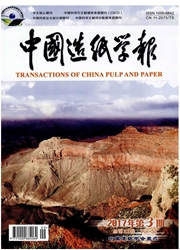

 中文摘要:
中文摘要:
将松香酸钠和硬脂酸钠以质量比1∶1均匀混合制得胶体物质(CS)模拟物,将松香酸钠、硬脂酸钠及聚丙烯酸钠以质量比1∶1∶1均匀混合制得溶解和胶体物质(DCS)模拟物。通过测定模拟物与Ca^(2+)反应前后溶液的浊度及Zeta电位、干扰物尺寸及形态,系统研究了造纸湿部系统中CS和DCS在Ca^(2+)作用下形成干扰物的历程及机理。结果表明,CS在白水中积累形成的以亲水基向外的胶束可与Ca^(2+)发生离子交换,然后碰撞聚集或继续结合CS的亲水端而构成憎水基朝外的胶束聚集体,并依据相似相溶原理继续吸附CS的憎水基而逐步增长成大胶黏物;聚丙烯酸钠可与Ca^(2+)反应形成沉积物,但其能以空间位阻机理稳定胶黏物。降低白水系统中DCS含量并控制Ca^(2+)浓度小于5 mmol/L有望减少干扰物生成量。
 英文摘要:
英文摘要:
In this study,the mixture of sodium resinate and sodium stearate in the ratio of 1∶ 1 in mass was used to simulate the colloidal substances( CS),and the mixture of sodium resinate,sodium stearate and sodium polyacrylate in the ratio of 1∶ 1∶ 1 in mass were used to simulate the dissolved and colloidal substances( DCS) existed in white water of papermaking wet end system. The forming process and mechanism of insoluble interferent from soluble substances CS and DCS in the existing of calcium ions was investigated by measurement of turbidity,zeta potential,particle size distribution and morphological observation of the simulated materials before and after reacting with Ca~(2+). The results showed that the micelles with hydrophilic groups in the sheath were formed when CS accumulated to a certain concentration in white water,the insoluble pitch interferent with high viscosity could be produced by particle-particle collision after micelles reacting with Ca~(2+); the micelles could also react with hydrophilic groups of CS,after they reacted with Ca~(2+)to form larger colloids with hydrophobic groups extending in the water,and then adsorbed other hydrophobic groups of CS due to similar polarity,and pitch interferent with large size was produced by"layer by layer"adsorption. Sodium polyacrylate could react with Ca~(2+)and cause deposition,while sodium polyacrylate could stabilize the pitch to a certain degree by steric stabilization. Reducing the content of DCS in white water and controlling the calcium ions concentration under 5 mmol / L could minimize the pitch deposition.
 同期刊论文项目
同期刊论文项目
 同项目期刊论文
同项目期刊论文
 期刊信息
期刊信息
